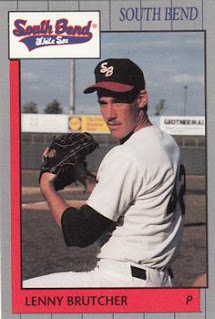Interview Part 3: Eric Fox, Next Pitch
 |
| Harrisburg shortstop Jason Martinson waits for a pitch at Metro Bank Park in August 2013. Martinson's hitting coach is third base coach Eric Fox, upper right. (G21D Photo) |
Maybe the umpire should have called the pitch before a ball, it was six inches outside, after all, but Eric Fox was ultimately glad the umpire didn't make that call.
A ball on this Opening Day of 1993 would have meant a bases-loaded walk and one run scored.
But, Fox recalled recently to The Greatest 21 Days, it was a called strike, and it set up the next pitch, which Fox deposited down the line and over the wall for a grand slam.
That is one of the lessons Fox tries to relay to his players now as a minor league hitting coach: Don't get upset at an umpire, he might have done you a favor.
"A lot of guys are set in their ways," Fox said before a recent game at Harrisburg's Metro Bank Park. "The first pitch, they don't think it's a strike and they're ruined the whole rest of the at bat.
"That pitch is gone," Fox added. "You look forward to the next pitch."
Fox kept getting next pitches in the majors over four seasons with the Athletics and Rangers, getting into 116 big league games. He has since gone on to a long career as a coach in the minors, absent some time spent away from the game with family.
 |
| Harrisburg third base coach Eric Fox applauds a play in August 2013 at Metro Bank Park. (G21D Photo) |
Once there, Fox worked to ensure he stayed there.
"It drives you," Fox said. "Once you're in the big leagues, you don't want to go back to AAA. It's deflating (to go back). It's the players that let it get to them that are the ones that never get back."
For his three years with the Athletics, Fox made the trip both ways multiple times. Once back in AAA, Fox said it was that much harder to get up for games.
"But that's the mental side," Fox said. "It's like pinch-hitting. It's one of the hardest jobs in all of baseball, but if you think you can do it, you can."
Fox also broached the topic of steroids. He said he had the chance to take them, but chose not to, getting his time in four big league seasons the natural way.
Guiding him was his brother, who was a doctor. His brother made clear to him the health risks and the unknowns. That aside, there was also the moral aspect, Fox said.
"I know why guys do them," he said, "but it's cheating the system.
"If you see a guy who doesn't have the talent that you do pass you up and start making all this money, you just kind of say to yourself 'I just got cheated.' So now more guys start doing them," Fox added.
 |
| Harrisburg second baseman Rick Hague takes a swing at Metro Bank Park in August 2013. Hitting coach and third base coach Eric Fox is in the upper right. (G21D Photo) |
He played most of his final season for AAA Scranton, He got there after being released from the Orioles and AAA Rochester days into the season.
Fox recalled getting that release by the Orioles, after driving cross-country to Florida and then Rochester. After his release, Fox recalled going out to dinner and watching the game, Rochester's home opener in its new ballpark on TV. "That's how much I loved baseball," Fox said.
He planned on driving back home to California the next day, but got a call. Scranton needed a body. A possible few weeks turned into the rest of the season and Fox was able to walk away on his own terms.
Scranton's hitting coach Bill Robinson also let Fox help in coaching some of the younger guys. "That's what got my juices going to coach," Fox said.
It took him a little bit to get a full-time coaching job the next year, but he got it, with the Indians in Columbus, Ga. Fox recalled playing in Columbus years earlier, finding it the hottest place on Earth and vowing never to go back. But, there he was, starting his coaching career in Columbus.
Fox continued to coach in the minors for the next several years, before finally stepping away from the game in 2007 to spend time with family.
 |
| Harrisburg hitting coach Eric Fox at Metro Bank Park in August 2013. (G21D Photo) |
"I have a new perspective than what I did when I was younger," Fox said of coaching. "I have more patience. I know how tough it is. I try to relate to these guys."
Fox isn't one to try to intimidate the players he coaches, he tries to motivate. He also tries to use those stories from his playing days to help motivate them.
The day Fox spoke, he and some other coaches were about ready to have a meeting with the players after a tough hitting stretch. The purpose of the meeting was to get their confidence back. The team, he said, had been hitting defensively, they weren't hitting aggressively.
His job, Fox said, is to help players get on to AAA and then to the majors. And that's what he's done. He wants his players to play their hardest because AAA and the majors are no guarantee.
"Time goes by so fast," Fox said. "I try to tell these players, hey, it could all be over tomorrow. If you can look yourself in the mirror and say, 'listen, I walked away on my own merits' or 'I gave it everything I had and didn't make it,' you can live with that."
Part 1: Sixth Tool | Part 2: Pumped Up | Part 3: Next Pitch







